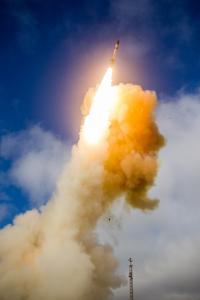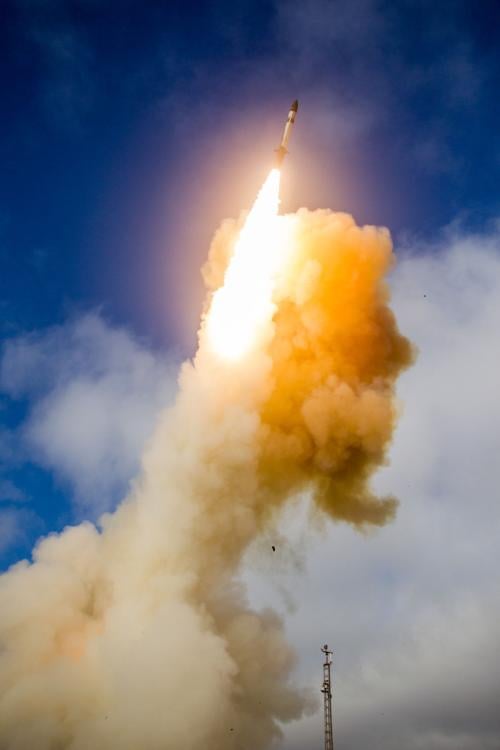Tucson-based Raytheon Missile Systems has signed what it calls a landmark agreement with California-based rocket motor maker Aerojet Rocketdyne to supply rocket motors for Raytheon’s tactical missiles through 2019.
The companies worked together for two years to find cost-saving opportunities they could work into future contracts, said John Brauneis, vice president of supply chain management for Raytheon Missile Systems.
Aerojet already makes rocket motors for Raytheon systems including its Standard Missile-3 interceptors.
Cost-saving opportunities may include changes in processes, materials, specifications and requirements, both technical or contractual, but such changes now must go through a tangle of red tape for approval, Brauneis said.
Under the agreement, instead of proposing and processing the cost-saving measures individually, Aerojet will factor them into its pricing, potentially saving the Pentagon and taxpayers millions of dollars, Raytheon says. In exchange, Aerojet will get more certainty for its production pipeline.
“We think we can save the DoD (Department of Defense) millions of dollars over the next four years with this deal,” Raytheon spokesman John Patterson said.
Raytheon Missile Systems President Taylor Lawrence called the pact a “landmark agreement’ that will help the Pentagon achieve its cost-saving goals under a program known as Better Buying Power 3.0.
Brauneis said he believes the “strategic sourcing agreement” is one of the most innovative approaches he’s seen in 36 years in the industry.
“The subcontractor gets an unprecedented level of certainty around its portfolio,” he said. “The prime contractor (Raytheon) is able to propose more affordable prices for its products in an increasingly cost sensitive marketplace, and the U.S. government is the ultimate beneficiary in terms of savings for the taxpayer.”
The agreement — which spans seven programs, nine products and all four armed service branches — shows Raytheon is trying to lead the industry in cost efficiency, a defense analyst said.
“Raytheon has been trying to turn its Tucson missile plant into a model of efficiency, and part of doing that is having long-term relationships with your suppliers,” said Loren Thompson, chief operating officer of the non-profit Lexington Institute.
It also represents a big vote of confidence in Aerojet, Thompson said.
“What Raytheon is really saying with this agreement is, Aerojet is its best supplier of rocket motors,” he said, noting that Raytheon along with its competitors contribute to the Lexington Institute.
The head of a think tank that has been sharply critical of Pentagon acquisition policies said the Raytheon-Aerojet agreement seems to be a step in the right direction.
“We’re encouraged by more strategic sourcing because of its potential to garner savings by leveraging buying power,” said Mandy Smithberger, director of the Straus Military Reform Project at the Center for Defense Information’s Project On Government Oversight. “We hope that taxpayers reap the savings as well.”
In prepared remarks, Aerojet Rocketdyne CEO and President Eileen Drake noted that her company already partners with Raytheon on propulsion components for some of the Pentagon’s most important programs.
“This agreement expands our long-term relationship with Raytheon and is a direct result of our commitment to deliver quality products on schedule, while remaining firmly focused on affordability,” she said.
Last year, Raytheon presented Aerojet Rocketdyne with an Award for Excellence in Affordability during a supplier conference in Boston.
In contrast, Raytheon has at times had a rocky relationship with the other major U.S. rocket-motor supplier, Orbital ATK. The two companies sued each other over a series of failures of ATK rocket motors on Raytheon’s Advanced Medium-Range Air-to-Air Missile, or AMRAAM, which halted deliveries of the nation’s top air-combat weapon for more than a year.
Raytheon’s announcement of its pact with Aerojet came a few days after the U.S. House rejected legislation that would have required at least two domestic rocket motor suppliers for tactical missiles.
That was widely seen as a measure benefiting Orbital ATK, which lost its business supplying rocket motors for the AMRAAM to a Norwegian company.
A series of failures of AMRAAM motors made by Orbital ATK prompted the Pentagon to suspend deliveries and withhold hundreds of millions of dollars in contract payments to Raytheon between 2010 and 2012.
AMRAAM production was restarted after Raytheon began buying motors from Nammo, a Norwegian defense contractor that delivered its 1,000th AMRAAM motor in 2013.
That prompted ATK to file a civil lawsuit against Raytheon that was later settled out of court.
Aerojet already provides two booster rocket stages and a maneuvering rocket system for Raytheon’s Standard Missile-3, which is part of the Aegis Ballistic Missile Defense system, as well as booster rockets for the related SM-2 and SM-6 ship-defense missiles.
It also makes a launch booster for Raytheon’s Tomahawk cruise missile, solid-fuel rocket motors for Raytheon’s Griffin mini-missile and its Stinger portable air-defense missile, and warheads for Raytheon’s TOW (Tube-launched, Optical Wireless-guided) portable antitank missile and Joint Standoff Weapon glide bomb.
Orbital ATK also is an important Raytheon supplier, providing the third-stage rocket motor for the SM-3, and last week it announced successful testing of an improved version.
ATK also makes rocket motors for Raytheon’s TOW missile, as well as for the Evolved Sea Sparrow ship-defense missile, Javelin anti-tank missile, Maverick air-to-ground missile and Sidewinder air-to-air missiles.





